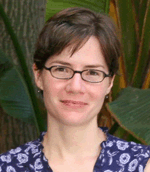Monica H. Green
Monica H. Green, Ph.D., is Professor of History at Arizona State University where she holds affiliate appointments in Women and Gender Studies, and the Program in Global Health in the School of Human Evolution and Social Change. She teaches courses in Gender History, Medieval History, and the Global History of Health. She has published extensively on various aspects of the history of medicine in premodern Europe, including Women's Healthcare in the Medieval West: Texts and Contexts (Ashgate, 2000), which was co-winner of the 2004 John Nicholas Brown Prize for the best first book in medieval studies; The Trotula: A Medieval Compendium of Women's Medicine (University of Pennsylvania Press, 2001); Making Women's Medicine Masculine: The Rise of Male Authority in Pre-Modern Gynecology (Oxford UP, 2008), which was awarded the 2009 Margaret W. Rossiter Prize for the best book on the history of women in science by the History of Science Society; and studies on other aspects of cultural and medical history. Dr. Green has served on the councils of the Society for Medieval Feminist Scholarship, the American Association for the History of Medicine, and the Medieval Academy of America. She is the founder and list manager of MEDMED-L, a discussion group for scholars interested in aspects of premodern medicine, particularly in the Middle Ages.
Contact information:
School of Historical, Philosophical, and Religious Studies
Arizona State University
P.O. Box 874302
Tempe, AZ 85287-4302
Phone: 480-965-4762
Fax: 480-965-0310
E-mail: monica.green@asu.edu
Web: https://webapp4.asu.edu/directory/person/384868
|
Rachel E. Scott
Rachel E. Scott, Ph.D., is Assistant Professor of Bioarcheology in the School of Human Evolution and Social Change at Arizona State University. She teaches courses in European Archaeology, Human Osteology, and the Global History of Health. Her research integrates human skeletal, archeological, and historical data to address questions about individual lived experience and community interaction in early Christian and medieval Ireland. Recent publications—including “Key Concepts in Identity Studies” (with Jane E. Buikstra) in Bioarcheology and Identity in the Americas, ed. K. J. Knudson and C. M. Stojanowski (University Press of Florida, 2009) and “Religious Identity and Mortuary Practice: The Significance of Christian Burial in Early Medieval Ireland” in Breathing New Life into the Evidence of Death, ed. A. Baadsgaard, A. Boutin, and J. E. Buikstra (SAR Press, 2011)—discuss and illustrate the relevance of bioarcheological analysis for reconstructing past social lives. In her work on disease, Dr. Scott considers the influence of both biological and social factors on the prevalence and human experience of disease. She is currently investigating the foundation and development of leper hospitals in medieval Ireland, focusing on differences between Anglo-Norman and Gaelic Irish perceptions of and reactions to leprosy. Dr. Scott has served as a national lecturer for the Archeological Institute of America in 2010-2011 and 2011-2012.
Contact information:
Center for Bioarcheological Research
School of Human Evolution and Social Change
Arizona State University
P.O. Box 872402
Tempe, AZ 85287-2402
Phone: 480-727-8620
Fax: 480-965-7671
E-mail: rachel.scott@asu.edu
Web: https://webapp4.asu.edu/directory/person/970380
|